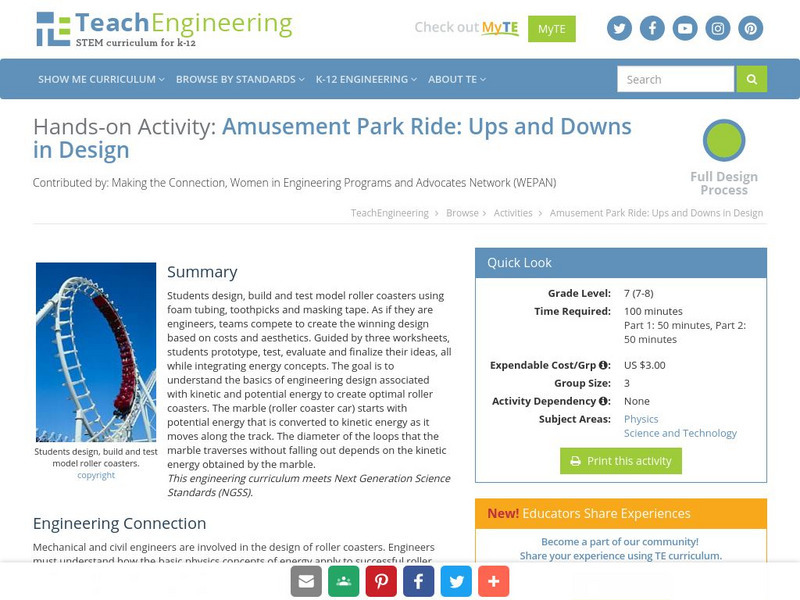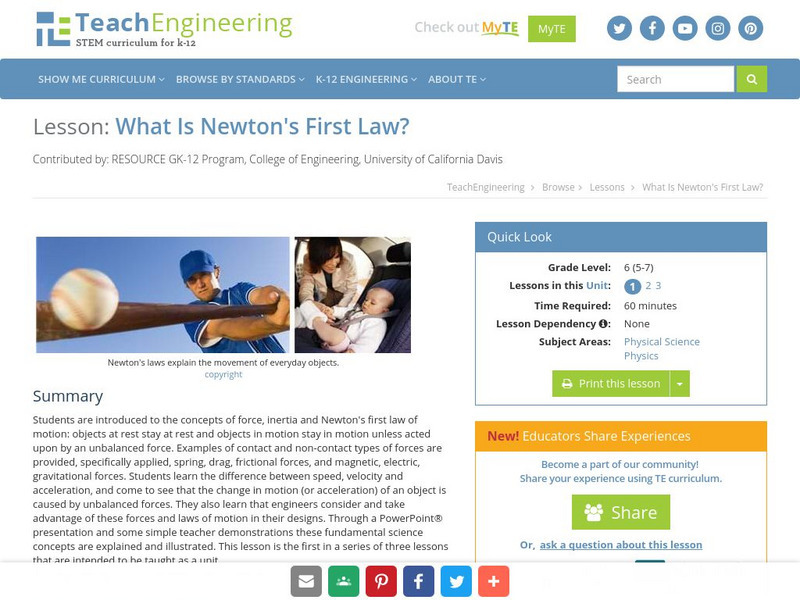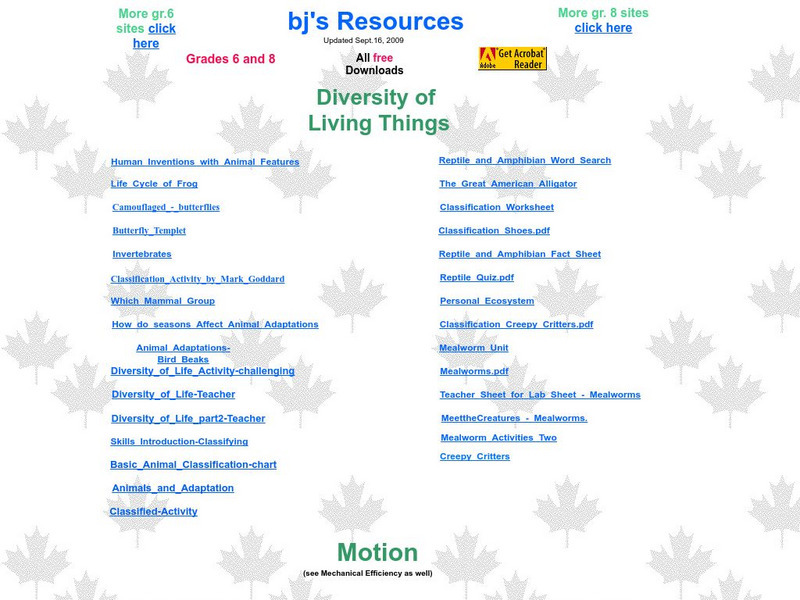Utah State Office of Education
Utah State Office of Education: Force, Energy, & Motion
A unit on energy, force, and motion presented with interactive and classroom activities. Students gain an understanding of weight, mass, potential and kinetic energy, sound, and heat with this engaging resource.
TeachEngineering
Teach Engineering: Energy of Motion
By taking a look at the energy of motion all around us, students learn about the types of energy and their characteristics. They first learn about the two simplest forms of mechanical energy: kinetic and potential energy, as illustrated...
Georgia Department of Education
Ga Virtual Learning: Ap Physics 1: Simple Harmonic Motion
In this unit, students will discover the period of time of one oscillation, the frequency of oscillation, the object displacement, its velocity, and its acceleration. They will also discover how to apply the principles of conservation of...
TeachEngineering
Teach Engineering: Up, Up and Away! Airplanes
The airplanes unit begins with a lesson on how airplanes create lift, which involves a discussion of air pressure and how wings use Bernoulli's Principle to change air pressure. Following the lessons on lift, students explore the other...
TeachEngineering
Teach Engineering: Mechanics Mania
Through ten lessons and numerous activities, students explore the natural universal rules engineers and physicists use to understand how things move and stay still. Together, these rules are called "mechanics." The study of mechanics is...
Wikimedia
Wikipedia: Centripetal Force
Wikipedia's site on centripetal force provides a section explaining the difference between centripetal force and centrifugal force. Includes formulas and hyperlinked terms.
Science Education Resource Center at Carleton College
Serc: Investigating Projectile Motion: Creating a Catapult
This instructional activity is for 9th grade physical science students. It begins with an inquiry-based instructional activity using a projectile motion computer simulation. It culminates with students building a catapult; applying and...
TeachEngineering
Teach Engineering: Amusement Park Ride: Ups and Downs in Design
This unit has students design and build foam tubing roller coasters. The design process integrates energy concepts as they test and evaluate their designs that address the task as an engineer would. The goal is for students to understand...
TeachEngineering
Teach Engineering: The Force of Friction
In the first of two lessons of this curricular unit, students are introduced to the concept of friction as a force that impedes motion when two surfaces are in contact. Student teams use spring scales to drag objects, such as a ceramic...
TeachEngineering
Teach Engineering: Surface Tension
Surface tension accounts for many of the interesting properties we associate with water. By learning about surface tension and adhesive forces, students learn why liquid jets of water break into droplets rather than staying in a...
Ducksters
Ducksters: Physics for Kids: Force
Kids learn about force in the science of physics and the laws of motion including units and measurement. How to calculate force from mass and acceleration.
Middle School Science
Middle School Science: Motion Notes
Personal site in which a teacher outlines a unit on motion. Probes through topics such as average speed, velocity, acceleration, speed, deceleration, force and more.
Alabama Learning Exchange
Alex: Experiencing Newton's Laws of Motion
This lesson will approach the study of Newton's 3 Laws of Motion using McGraw-Hill Science textbook Unit F. The students will be given an overview of the laws and vocabulary words to study. After introducing and explaining the concept of...
TeachEngineering
Teach Engineering: What Is Newton's First Law?
Students are introduced to the concepts of force, inertia, and Newton's first law of motion: objects at rest stay at rest and objects in motion stay in motion unless acted upon by an unbalanced force.This lesson is the first in a series...
TeachEngineering
Teach Engineering: Sliding Textbooks
In this culminating activity of the unit which highlights how forces play a role in engineering design and material choices, students explore and apply their knowledge of forces, friction, acceleration, and gravity in a two-part experiment.
My Science Site
Life Systems: Cells, Tissues, Organs
Extensive site for teachers provides some helpful resources that pertain to plant and animal cells. Includes a microscope diagram as well as plant, animal and pond labs. Also contains links to structures and mechanisms, matter and...
City College of New York
City Technology: Fantastic Elastic
Explore engineering technology with this unit. Students will study how to design and execute two types of homemade vehicles using elastic.
Other
Mattel: Hot Wheels: Speedometry
This resource is part of a two unit curriculum designed for fourth-graders using the 5E Instructional Model (Engage, Explore, Explain, Elaborate and Evaluate) to support students as they investigate the effect that height and other...
Ducksters
Ducksters: Physics for Kids: Pressure
Kids learn about pressure in the science of physics and the laws of motion including units and measurement in pascals. Calculate pressure using force divided by area.
Ducksters
Ducksters: Physics for Kids: Work
Kids learn about work in the science of physics and the laws of motion including units and measurement. Calculate work using force times distance.
Alabama Learning Exchange
Alex: How to Make Something Simple, Hard
Students will have completed a unit of forces and motion prior to the current unit of study on simple machines (lever, inclined plane, screw, wedge, pulley, wheel and axle). Students will review the functions and examples of simple...
















